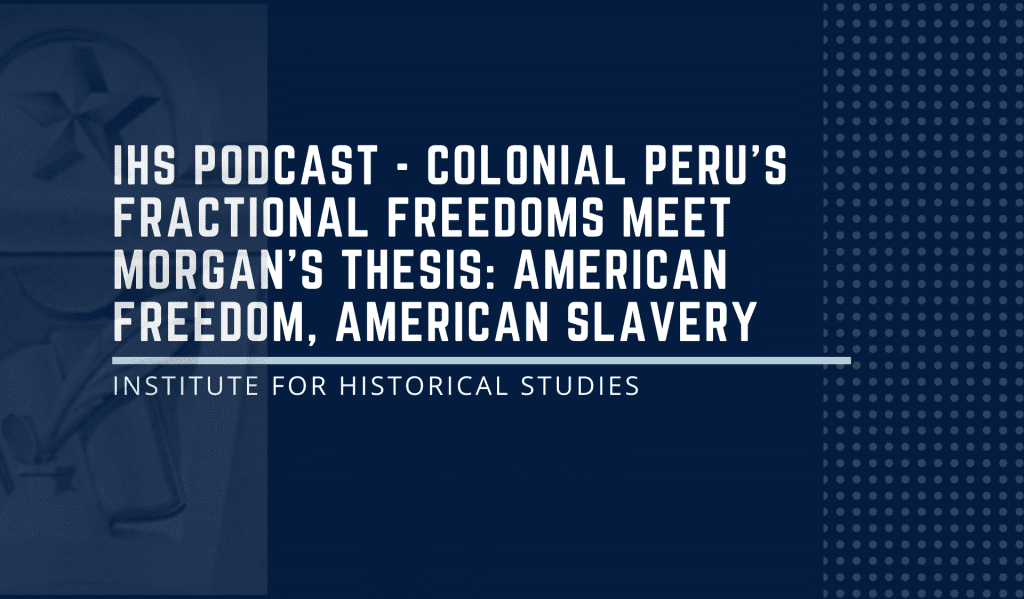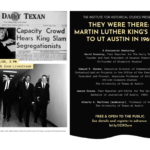
IHS podcasts are a new podcast series initiated by the Institute for Historical Studies’ Director, Dr Jorge Cañizares-Esguerra. They are paired with weekly workshops and are designed to foster discussion between graduate students and distinguished scholars in the field. Along with graduate students and guests, each episode features Dr Cañizares-Esguerra and Ashley Garcia, a PhD Candidate in History at UT Austin. This podcast is recorded in connection with a roundtable, Singing in the Coat of the Rebels: Pardo Republics Gender Politics and the Making of Mexican Citizenship, presented by Gary Leo Dunbar, University of Texas at Austin, on 27 September. Details can be found at https://bit.ly/3lFTOx8.
Introduction
Fragments of Freedom confronts us with the most basic question of US historiography: American Slavery made American Freedom possible. Dr. McKinley shifts the ground to concepts of freedom in slavery that were more typical in societies other than colonial and national Anglo America. Using ecclesiastical archives in Lima, Peru, in the 17th century, Dr. McKinley shows that enslaved peoples negotiated the limits of domestic sexual violence and the limits of enslavers’ control over individual families. American exceptionalism notwithstanding, from Iraq to India to Peru, the religious and lay state regulated the power of the enslaver. And in the case of Peru, the Church could ritually humiliate enslavers via moral subpoenas through the pulpit. Enslavers reluctantly offered testimony to counter charges by enslaved peoples against their will because the church made their names public in sermons and on broadsides posted on the walls of parishes. The result of this muscular involvement by clerical courts in the lives of both enslavers and enslaved peoples is that domestic slavery was characterized by a full gamut of fractional freedoms. Slavery did not move teleologically toward cathartic forms of “liberation” via manumission or enslaved self-purchase. ‘Freedom” was another option within ever shifting structures of domestic subordination and negotiation ~ Jorge Cañizares-Esguerra
Guests
Gary Dunbar is a doctoral candidate in Latin American history. His teaching and research interests include Atlantic and Pacific World histories. His dissertation examines the history of slavery, abolitionism, and citizenship in the Americas with a specific focus on Pacific Mexico. Gary holds a bachelor’s degree in anthropology from the University of Oregon and completed his master’s work at Central Michigan University (CMU) in the U.S. and Benemérita Universidad Autónoma de Puebla (BUAP) in Mexico.
Dr. Michelle McKinley is the Bernard B. Kliks Professor of Law at the University of Oregon Law School and director for the Center for the Study of Women in Society. She teaches in the areas of Public International Law and feminist studies. McKinley has extensively published work on public international law, Latin American legal history, and the law of slavery. Her monograph, Fractional Freedoms: Slavery, Intimacy and Legal Mobilization in Colonial Lima, 1600-1700 was published by Cambridge University Press in 2016. She has received fellowships for her research from the American Council of Learned Societies, the National Science Foundation, National Endowment for the Humanities, the American Philosophical Society, and the Newberry Library. Prior to joining the academy, Professor McKinley was the former Managing Director of Cultural Survival, an advocacy and research organization dedicated to indigenous peoples. She is also the founder, and former director, of the Amazonian Peoples’ Resources Initiative, a community based reproductive rights organization in Peru, where she worked for nine years as an advocate for global health and human rights.
Hosts
Jorge Cañizares-Esguerra is Alice Drysdale Sheffield Professor of History at the University of Texas at Austin and the Director of the Institute for Historical Studies.
Ashley Garcia is a PhD candidate at the University of Texas at Austin. Her research includes 19th century political history, American communitarianism, and American political thought. Her dissertation, “An American Socialism: The Associationist Movement and Nineteenth Century Political Culture,” explores America’s most popular utopian socialist program: the Associationist movement of the 19th-century. Ashley has also completed a Portfolio in Museum Studies as her secondary PhD field.
The views and opinions expressed in this article or video are those of the individual author(s) or presenter(s) and do not necessarily reflect the policy or views of the editors at Not Even Past, the UT Department of History, the University of Texas at Austin, or the UT System Board of Regents. Not Even Past is an online public history magazine rather than a peer-reviewed academic journal. While we make efforts to ensure that factual information in articles was obtained from reliable sources, Not Even Past is not responsible for any errors or omissions.



